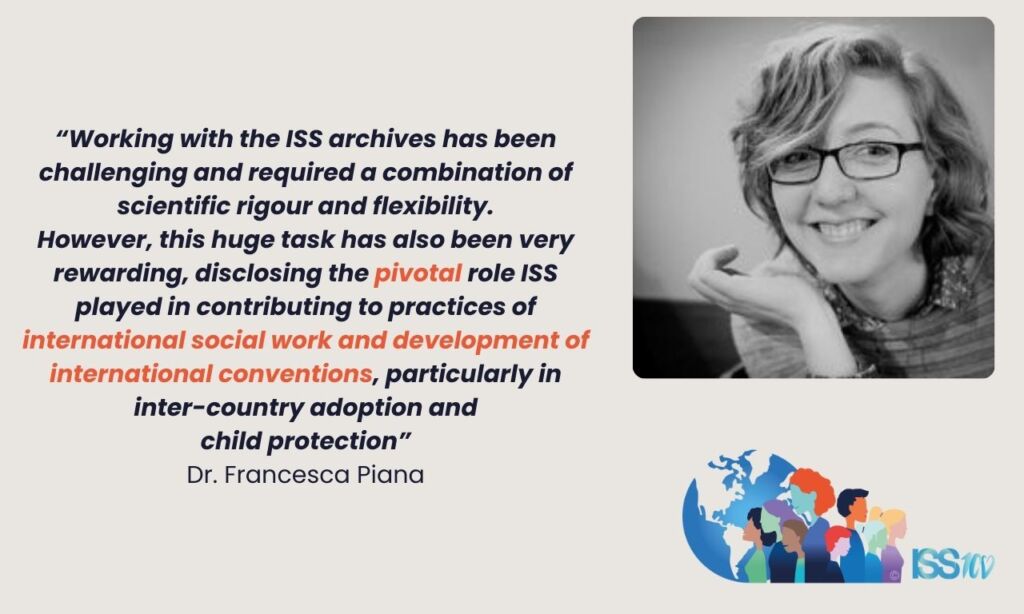
Behind the Scenes: An interview with Dr. Francesca Piana sharing insights on unveiling the history of the International Social Service
- Written by: Apolline Foedit, PhD student in International History, the Graduate Institute, Geneva
- Events Worldwide
I worked with Dr. Francesca Piana during the summer of 2023 at the archives of the International Social Service (ISS) General Secretariat in Geneva. The main goal was to select and analyse archival sources, as well as to create the content for the ISS 100th Anniversary exhibit to be opened to the public in September 2024. While a handful of historians have brilliantly illuminated crucial aspects and moments of ISS history, much must be uncovered. The task of the research group composed by Dr. Piana, MA student Corine Ngaleu, and me, proved challenging and fascinating.
Apolline Foedit: Thank you for taking the time to speak with me, Francesca. Let’s delve into your fascinating work with the ISS archives. Could you start by telling us about your work, and what led you to this project?
Francesca Piana: Thanks for this opportunity. I am a historian of modern European and international history, based at the Department of Humanities of the University of Trento, Italy. I am interested in the study of power, relations, and representations in regimes of migration and care. I pay attention to the history of international, non-governmental, and missionary organizations, to the work of international officers, humanitarians, and relief workers, as well as to the action of the persons assisted. A few years back, I discovered ISS, by looking at one of its early members, Suzanne Ferrière. Since July 2023, I have been working with Cilgia Caratsch and Carole Baumgart-Aubert of the International Social Service Switzerland to help organize the 100th Anniversary exhibit showcasing ISS’ historical and current activities.
Apolline: Could you elaborate on what you found particularly challenging during your work with the ISS archives?
Francesca: Absolutely. One of the challenges stemmed from the limited number of historians who know the history of ISS. While we now have a sounded sense of the emergence and first decades of ISS, the practices of inter-country adoption of children from Europe and Asia to the US in the aftermath of WWII, or the link between social work and private international law, other topics are open to examination. Moreover, the work in the archives was complicated by the fact that, in the summer of 2023, the inventory was still much ongoing. Not to mention that the files of individual cases from the period 1924-1964 had been destroyed, most likely in the 1980s. A real brain-teaser! However, I elaborated a strategy – a combination of scientific rigour and flexibility to deal with the huge task – and I was lucky enough to rely on the collaboration of two assistants. Also, the fact that I needed to respond to the needs of a highly interdisciplinary team was a great deep learning process. As my colleague Ursula Gillman would say, preparing an exhibit is like playing a ping-pong match, an action to a reaction.
Apolline: Could you tell us about some of the findings that emerged from your research?
Francesca: Our research sheds light on the pivotal role the ISS played in contributing to international conventions, particularly in areas such as international adoption, maintenance, or child protection. Additionally, we gained a deeper understanding of the organisation’s efforts in assisting unaccompanied children, highlighting the breadth of its impact beyond individual cases from the 1920s onwards. Notably, we uncovered some particularly important documents that provided precise data on the number of cases handled by ISS and the evolving of the ISS casework methodology. I’m also excited to share that we now have a better sense of the ISS timeline, milestones, and network development on a global level.
Apolline: This brings me to another question: could you tell us a little bit more about your methodology?
Francesca: Certainly. To have a broader sense of ISS history, we started by examining general documents, including annual reports or summaries of activities. This allowed us to identify key themes, actors, and significant dates. We then determined the main themes on which the organization worked and still does – including assistance to migrants and refugees, international child protection, adoption and search of origins – and studies each of them separately. Most of the time we only had a vague idea of the content of archival boxes; it’s with patience, a lot of coffee, and fruits for vitamins that we navigated the frustration and excitement of the exercise. We also had the chance and responsibility to select and study quite a few individual cases, which opened a delicate window into people’s lives as well as into the questions of privacy and data protection.
Apolline: One final question: will you stay involved with the archives, and if so, how?
Francesca: Absolutely. In 2023, I brought to the archives the students that attended my seminar “Refugees and the Global Cold War” at the Global Studies Institute of the University of Geneva. In January 2024, together with the HIDDEN network (History of Identity Documentation in European Nations: Citizenship, Nationality and Migration), I organised a workshop entitled “Searching for documents, restoring links: exploring the archives of the International Social Service in Geneva”. During the workshop, colleagues from all over Europe had the chance to start exploring the archives of ISS. And there’s more to come, stay tuned!
Apolline: Thank you, Francesca, for sharing your insights into this vital area of historical research. I wish you all the best in your future endeavours!
Francesca: Thank you for the opportunity to discuss our project. It’s been a pleasure!